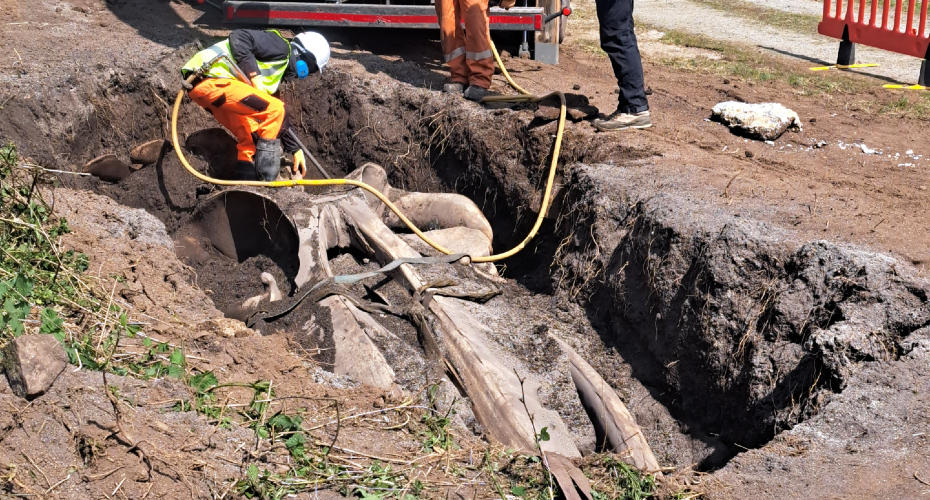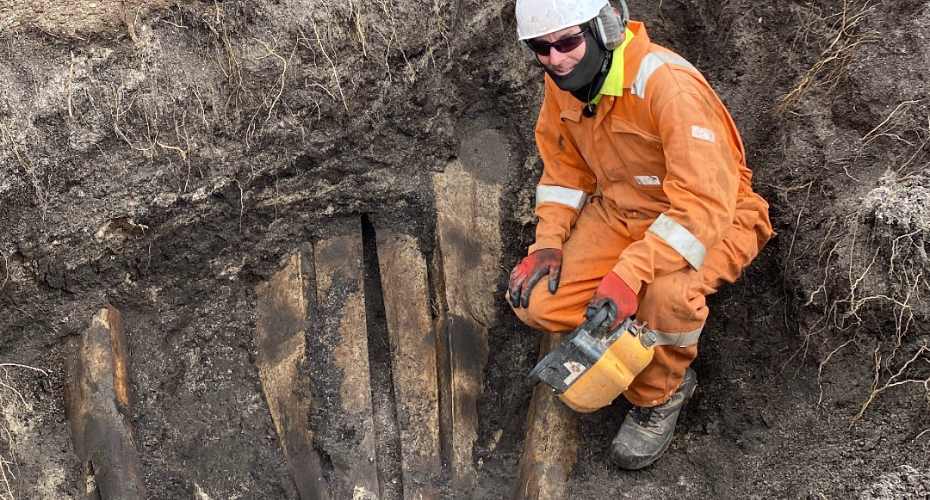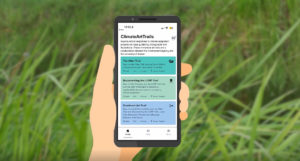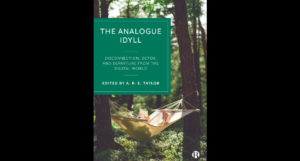University experts feature on BBC podcast exploring the life and legacy of an ocean giant

The story of a giant whale that died after becoming stranded on a Cornish beach, before being ‘inherited’ by the University of Exeter, has been told in a new BBC podcast.
The Whale, Secrets of a Stranding, explores how a 60-foot female Fin Whale – the second largest marine animal on Planet Earth – came to rest on the Lizard Peninsula.
The 30-minute documentary goes in search of what happened to it and considers its potential legacy by talking to those who interacted with it in its final hours and in the five years since.
Among them are researchers in the Centre for Ecology and Conservation at the University of Exeter, Cornwall, and English and Creative Writing scholar Dr Peter Riley, who has researched and written about human interactions with whale strandings.
Stephanie Marshall, the BBC’s Senior Head of Content Production for the West and South West, said: “This is an extraordinary story – a tale that begins on a Cornish beach and ends with a scientific triumph. It’s not just about a whale; it’s about community, conservation, and curiosity. ‘Whale: Secrets of a Stranding’ captures the spirit of our region and the global importance of protecting our oceans.”
The podcast picks up the story of the Fin whale – a species that can grow up to 27 metres in length – after it beached on Parbean Cove in February 2020. Specialists from the British Divers Marine Life Rescue team tried to keep the animal alive, dousing it with water in the hope that it might be refloated during high tide. But the whale, which was later found to be severely malnourished, was too weak to survive.

Some weeks later, the two-tonne head of the whale was given to ecologist Robbie McDonald, then a Professor in the Environment and Sustainability Institute (and also interviewed on the documentary). Professor McDonald saw the research potential in studying its decomposition and so arranged for it to be buried in specially prepared soil in the research field close to the Penryn campus.
For five years, the whale remained submerged, two metres down, until in April of this year, when she resurfaced once again. Over the course of ten hours, a team used specialist vacuum excavation equipment to remove the soil, with the BBC team filming the operation. Organisms in the soil had, but for one piece of blubber, stripped it clean.
“It’s fantastic,” said Robbie, who remains an Honorary Professor with the University. “We didn’t know what to expect after five years underground, but it’s come out really clean. This skull is a gargantuan reminder of what we can do to improve the marine environment.”

Emma Hunter, a PhD candidate in the Centre for Ecology and Conservation, is also featured in the documentary. She is currently researching the impact that ingesting plastic can have on megafauna – large marine animals. As part of this, she will be examining the intestines of another Fin whale that died following a stranding in Cornwall in 2023.
As revealed in the story, however, Emma’s contribution has gone beyond pure science. She has helped inspire a new poem.
“The idea arose partly from my experience at the (2023) stranding, but also from my time living in Aotearoa New Zealand and seeing the spiritual connection that people have to these animals,” she said. “Later, I attended a feedback session and suggested that we find a Cornish way of honouring the animal before we began to take samples. The idea was well-received, and a member of the British Divers Marine Life Rescue team approached songwriter Harry Glasson, and this led to the creation of the poem.”
That connection between writing and whales has been also at the heart of work undertaken by Dr Riley, who is a Senior Lecturer in American Literature, in the Department of English and Creative Writing. Dr Riley travelled down to Penryn to witness the whale being disinterred and was later interviewed by presenter Jemma Woodman about his work.
“It was a truly strange and moving experience, involving a specialist vacuum excavator and a good deal of disorientation about what, exactly, we were looking at,” he said. “Was the whale upside down? Right side up? Had the worms and micro-organisms sufficiently cleaned the bones?”
Dr Riley’s book, Strandings: Confessions of a Whale Scavenger, explored the bizarre subculture of people descending on whale carcasses to scavenge ‘trophies’. Released to critical acclaim in 2022, it won the Ideas Prize for Non-Fiction, was featured as the cover story of the Financial Times Weekend Magazine, and was adapted for BBC Radio 4.
“An alien visitor from the deep, a whale simultaneously arrives as an old acquaintance – its appearance on a beach a malfunction in the natural order, evidence of man’s errant stewardship of the earth, but also a homecoming,” he says. “Whales once stalked the earth with us, as us: our shared mammalian bone structure forming on terra firma 50 million years ago. At some point, they decided to get back into the sea.
“There are indigenous communities that know this and believe that whales beach themselves when they are ready to return to the fold. A leader of this Māori community will walk up to a stranded whale and welcome it back as family. Compare the bones of a human hand and a whale fin, and you are left with the shocking strangeness of how intimately connected we are as species. A single form cascading into divergent futures.”
Discussions are now underway as to the future of the whale skull, with the possibility that a permanent installation will be created on the Penryn campus. For now, like the head itself, these plans remain under wraps.
“This story reflects so much of the work the University conducts in relation to our environment,” adds Professor Brendan Godley, Director of the Graduate School of Environment and Sustainability. “It speaks to our education and research across marine science, from the health of our ocean to the way ecosystems are adapting or otherwise to these rapid changes.
“It also reflects our deepening engagement with the world around us, mediated through humanities and social sciences, where our scholars play such a valued role in communicating these issues to the public – capturing imaginations.”
The Whale, Secrets of a Stranding is available on BBC Sounds, and the story has also been covered across national and regional BBC radio and television.



